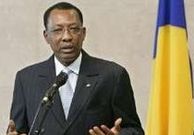Chad breaks off diplomatic ties with Sudan
April 14, 2006 (N’DJAMENA — Chad broke off diplomatic relations with Sudan on Friday and threatened to expel 200,000 Sudanese refugees, blaming its neighbor for a rebel attack a Cabinet official said killed 350 in the capital.
 President Idriss Deby said he would expel the refugees who fled Sudan’s troubled Darfur region by June 30 if the U.N. and the African Union did not help stop what he said were Sudan’s attempts to destabilize his government.
President Idriss Deby said he would expel the refugees who fled Sudan’s troubled Darfur region by June 30 if the U.N. and the African Union did not help stop what he said were Sudan’s attempts to destabilize his government.
Gen. Mahamet Ali Abdullah said he did not have a breakdown of the 350 people killed during Thursday’s assault on N’Djamena, but he said the toll included government troops, rebel forces and civilians.
He said the army captured 271 rebels and 14 pickups they used, some mounted with anti-tank and anti-aircraft guns. Troops paraded the rebel prisoners and laid out the bodies of dead insurgents at the National Assembly building on Friday.
Deby repeatedly has accused Sudan of hiring mercenaries to overthrow his government. Sudan has denied the accusation, and in turn has accused Chad of supporting fighters in its volatile Darfur region, where Arab militias and African rebels have fought for nearly three years.
“The international community has been totally deaf and dumb on the situation between Sudan and Chad,” Deby said after an emergency Cabinet meeting. They “need to understand the situation and that enough is enough.”
Deby said he ordered Sudanese diplomats out of the country, but a spokesman for the Sudanese Embassy in N’Djamena said they had not received any official communication on the decision.
“We are waiting for the government to notify us,” said the official, who would only identify himself as Hamid.
The U.N. Security Council and the African Union Peace and Security Council both condemned Thursday’s attack and called on Chad and Sudan to prevent more violence or an escalation of tensions. The U.N. has long warned the violence in the Sudanese province of Darfur would destabilize the region, especially Chad.
The majority of rebel prisoners were under age 25, and many claimed to be Sudanese who had been conscripted into the rebel United Forces for Change. One said he was an adjutant in the Sudanese army, while another was recognized by loyalist troops as a former Chadian soldier.
Some said they had been assured that Chad’s forces would not fight once the rebels entered the capital.
The rebels charged 620 miles in three days in pickups from their bases near the Darfur border and came close to capturing the National Assembly building in the center of N’Djamena. Government troops pushed them back with tanks, artillery and attack helicopters.
“After the battle yesterday morning, military and security forces mopped up in the city outskirts, taking out the rebels in their hiding places,” said Abdullah, a Cabinet minister, insisting there was no immediate threat of another attack.
Deby has declared victory over the rebels, following the second attempt to overthrow him in less than a month. Army officers first attempted to overthrow him while he was out of the country on March 14.
Deby has seen his authority undermined by violence across the border in Sudan’s Darfur, where the rebels are based. The path to power in Chad via Darfur is something Deby knows well — he seized power in a 1990 coup launched from there himself.
A Web site that said it represented the rebels reported Thursday that rebel troops were on the move to the north and east of N’djamena and were regrouping. There was also a statement claiming that rebel forces now controlled two towns near the Sudanese border, Adre and Am-Timam, but the report could not be independently verified.
Chad, an arid, landlocked country of 10 million about three times the size of California, has been wracked by violence for most of its history, with more than 30 years of civil war since independence from France in 1960 and different small-scale insurgencies since 1998.
The competition for power has become more intense since the country began producing oil. An Exxon Mobil-led consortium exported 133 million barrels of oil from Chad between October 2003 and December 2005, according to the World Bank. Chad, which receives a 12.5 percent royalty on each barrel exported, earned $307 million, the bank said.
The Sudanese government is accused of unleashing Arab tribal militias to murder and rape civilians and lay waste to villages in Darfur, though it denies the charge. More than 200,000 refugees have fled to Chad, and the conflict has left about 180,000 dead over the last three years — most from disease and hunger.
(ST/AP)
